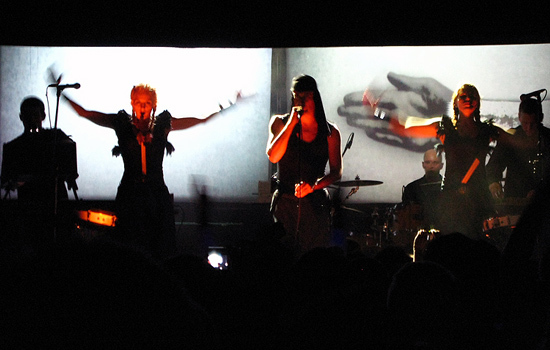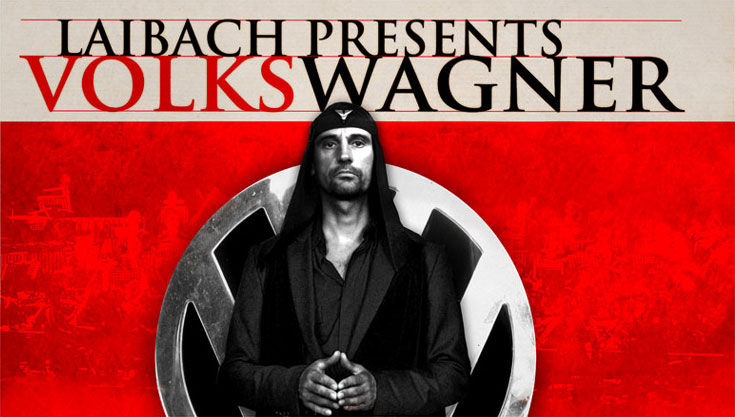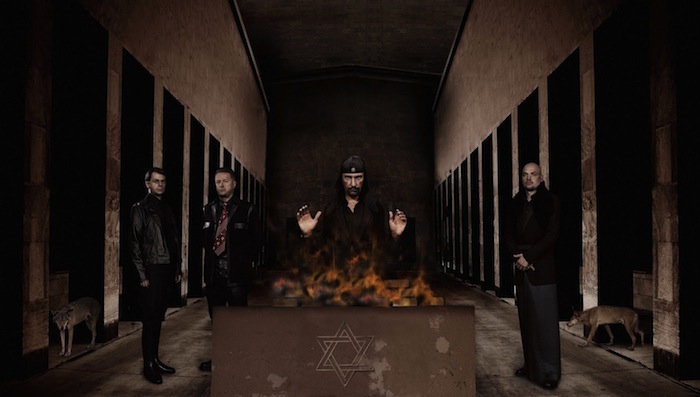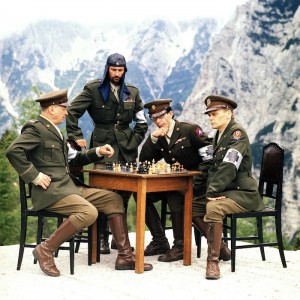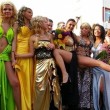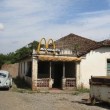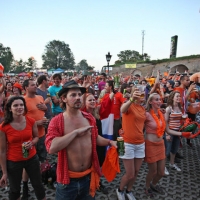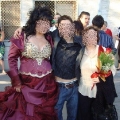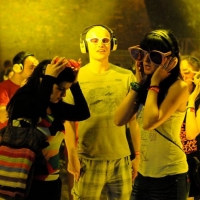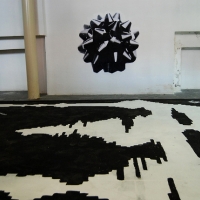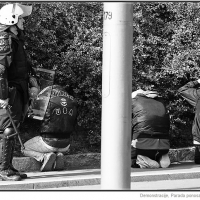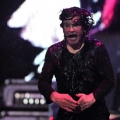If Goran Bregovic sells the West the stereotypes of the romantic Balkans, Laibach, on the other hand, balkanise the romanticism of stereotypes for the same West. Nazipop icons? Ingenious! The impossible is possible*
Laibach are not, of course, Slovenia, just as Slovenia is not Laibach. The chief irony is in the fact that Laibach are not a Slovene export but primarily an import. Their main record label is the UK-based Mute Records (part of the EMI Group) and the majority of their albums have been released abroad and imported to Slovenia. Being a band with content, an elaborate strategy and a recognisable ‘brand’ has long required something more than merely a group of four or five guys doing something; it requires constant action and includes a large number of collaborators, a lot of coordination and organisation and a huge amount of will power and hard work.
The members of Laibach have become a co-dependent part of the machinery that they set in motion way back in 1980 and, just like all the others, they have to get their heads down and work. It has never been their intention to swim against the mainstream. They prostitute themselves intelligently and with more refinement, so that it stinks as little as possible. After all, they have already sold a million records. Why shouldn’t they sell a few more? In the end, all of us first build a material foundation in our lives so that on it we can create the conditions for a superstructure. And this superstructure is the exercising of personal and collective freedom.
These days alternative groups turn to big record companies for protection, but they don’t want anything to do with them, because anyway they don’t sell enough records to make any serious money. Except of course if they don’t strum the tune that the dictates of the market and the major labels would like. Laibach, though, are not burdened by any especially protective attitude towards their music. They don’t believe in the originality of authorship and even claim that plagiarism does not exist. Since they do not consider themselves proper, traditional ‘musicians’, they have never seen music as something untouchable. At most, it has been one of the languages they have used in their ‘social’ campaigns and performances. This is more or less the situation even now. Perhaps they really are merely good enough.
I sincerely believe that there is no other group from this part of the world that has actually done as much. I am not sure if they can exactly be said to have done it for ‘Slovene music’, but there is no doubt that they have done a great deal for the promotion of Slovenia. It is also true that no other Slovene group or performer has released and sold as many records as they have – if this is a relevant criterion. (Except of course the Avsenik Ensemble, who are a unique international phenomenon all of their own.)
Essentially, what they are is a kind of social institution, engineers of human souls, operating in the framework of popular culture. This language has still not been completely decoded, which means that it can still function. Like [Slovene ‘turbo-folk’ group] Atomik Harmonik, [their single] Brizgalna brizga, [their album] Brizgaaaj – it is not something one thinks up just like that. Some other consideration, not merely vulgar profit, could be at work here; there might even be something socially subversive about it – and I mean that in a positive sense.
Yet more proof that anyone can be Laibach, even those who are just about ‘make up’ [a reference to Laibach’s two female backing singers moonlighting from pop group Make Up 2]. You see how things are actually banal and simple: all you need to do is put on a suitable mask, pull the right strings, and already people accept you and follow you, even though what you are telling them is totally devoid of meaning. The utopian projection of individual success and personal freedom (the realisation of the ‘American Dream’) is carefully guarded and cared for in the corporate industry of the consciousness by the ranks of anonymous individuals who project their own desires, energy and fantasies into a kind of collective substratum (brands, athletes, film stars, TV personalities, pop stars, royal families, Lady Di, etc.) and then draw on it themselves.
So what is left for Laibach in this gregarious world of human sheep not dedicated to higher goals? To be wolves dressed as shepherds, or shepherds dressed as wolves? If pop is for sheep, then Laibach are wolves dressed as shepherds. If sheep are for pop, then Laibach are shepherds dressed as wolves. [Goran] Bregović sells the West the stereotypes of the romantic Balkans. Laibach, on the other hand, balkanises the romanticism of stereotypes for the same West. Nazipop icons? Ingenious! The impossible is possible. When Laibach are in the game, everyone thinks that they have to see something more than there actually is. They have already manipulated their audience to such a point that now what the audience mainly asks of them is demanipulation. Manipulation of the manipulation. Because history goes on and mercilessly devours its children into the bargain.
*The above is nothing more than a simple collage of statements made by Laibach in past interviews, with the exception of a single sentence which is copied from the founding charter of the Neo-National Slovene Congress (NSK). Allegedly, it was compiled by one Gregor Bulc in 2009.
Who are Laibach?
Laibach is the German name for Ljubljana, Slovenia’s capital city. Laibach the group, founded on 1 June 1980 in Trbovlje, Yugoslavia, is the predecessor and at the same time the musical branch of the influential 1980s art movement Neue Slowenische Kunst (NSK).
The movement’s swansong and resurrection from the ashes came in 1992 with the establishment of the virtual NSK State, a state in time with no territory of its own, with more officially registered citizens than the Vatican.
Between 1983 and 1987 the authorities in socialist Yugoslavia banned Laibach – who since the outset have been accused of both right-wing and left-wing extremism – from appearing in public, and prohibited the use of the name Laibach. Today, by contrast, the group is considered by many people to be among the most prominent promoters of Slovenia to the outside world.
Laibach usually appear in public as a collective whose individual members are not singled out for attention. Laibach’s statements are often polysemous, ambiguous, and they do not shy away from discursive repetitions and reinterpretations of the texts of other artists, theorists or Laibach themselves. Even since the fall of the Berlin Wall, Laibach have continued to elicit controversial reactions all around the world, be it with political addresses before and during concerts, specific slogans and visual solutions, their ambiguous criticism of nationalisms, their challenging of religious institutions and rituals, their equating of democracy and totalitarianism, or, more recently, their reworkings of national anthems, along with a digital interpretation of J. S. Bach’s The Art of the Fugue and the reworking of Richard Wagner’s The Ride Of The Walkyries in collaboration with Symphonic orchestra RTV Slovenia.


